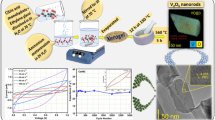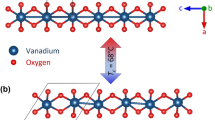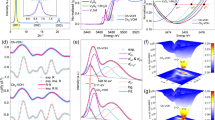Abstract
AT temperatures above the melting point of vanadium pentoxide (675° C), the rate of oxidation of vanadium is extremely rapid and the kinetics have been described1 in terms of the following equation  where w is the weight of oxygen absorbed per square cm, t is the duration of oxidation, and a, k and m are constants with m, the rate index, close to 0.7. Although not entirely unknown2,3, such a value is both unusual and difficult to rationalize. It has been considered to be due to a combination of linear and parabolic processes, presupposing similar activation energies unless m is temperature dependent.
where w is the weight of oxygen absorbed per square cm, t is the duration of oxidation, and a, k and m are constants with m, the rate index, close to 0.7. Although not entirely unknown2,3, such a value is both unusual and difficult to rationalize. It has been considered to be due to a combination of linear and parabolic processes, presupposing similar activation energies unless m is temperature dependent.
This is a preview of subscription content, access via your institution
Access options
Subscribe to this journal
Receive 51 print issues and online access
$199.00 per year
only $3.90 per issue
Buy this article
- Purchase on SpringerLink
- Instant access to full article PDF
Prices may be subject to local taxes which are calculated during checkout
Similar content being viewed by others
References
Price, W. R., and Stringer, J., J. Less Common Metals, 8, 165 (1965).
Stringer, J., J. Less Common Metals, 6, 207 (1964).
Gebhardt, E., and Seghezzi, H. D., Z. Metallkunde, 50, 248 (1959).
Author information
Authors and Affiliations
Rights and permissions
About this article
Cite this article
PRICE, W., STRINGER, J. Oxidation of Vanadium in the Liquid Oxide Region. Nature 212, 1356 (1966). https://doi.org/10.1038/2121356a0
Issue date:
DOI: https://doi.org/10.1038/2121356a0



